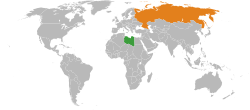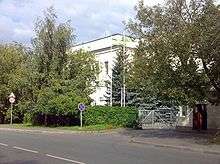Libya–Russia relations
 | |
Libya |
Russia |
|---|---|

Libya–Russia relations (Russian: Российско-ливийские отношения; Arabic: العلاقات الروسية الليبية) is the bilateral relationship between the two countries, Libya and Russia. Russia has an embassy in Tripoli, and Libya has an embassy in Moscow. Diplomatic contact between Russia and Libya has generally been close and productive; seeing as both countries have had and continue to see volatile relations with the United States. Leader Muammar al-Gaddafi was a close ally of the Soviet Union, despite his country's membership in the Non-Aligned Movement; also Russia regarded Libya as one of its strongest allies in the Arab world. After the Libyan Civil War Russia has supported stabilizing the country, and since the outbreak of the new conflict it has primarily backed the Tobruk-based Council of Deputies over the UN-backed Government of National Accord and various other factions.
The current Russian ambassador to Libya is Ivan Molotkov,[1][2] while Fatuma M. Mamlouk is the chargé d'affaires at the Libyan embassy in Moscow.[3]
Soviet era
Historically, the Libyan Arab Jamahiriya under Muammar Gaddafi had good relations with the Soviet Union, which provided the Arab nation with weaponry and military advisers throughout the 1970s and 1980s.[4]
1991–2011
In April 2008, Vladimir Putin visited Libya, which was the first visit by a Russian President to Libya.[5]
Although Russia has criticized NATO's campaign in Libya, Dmitry Medvedev suggested that Colonel Gaddafi lost legitimacy and requested that he step down.[6] Nonetheless, Russia maintained a diplomatic presence in Tripoli with the Gaddafi government until September 2011 when Moscow switched recognition to the anti-Gaddafi National Transitional Council.
Vladimir Putin lashed out at U.S. for killing Gaddafi and asked "They showed to the whole world how he (Gaddafi) was killed; there was blood all over. Is that what they call a democracy?"[7] Foreign Minister Sergey Lavrov said Gaddafi should not have been killed, and added that his death should be investigated.[8]
Russia had joined the arms sanctions against Libya, suspending all contracts for the supply of military hardware to the country in 2011 during the Libyan Civil War. On 7 May 2012, Russia lifted its embargo on arms supplies to Libya.[9]
Since 2011
In 2013, after the Russian embassy in Libya was attacked, all Russian diplomats and their families were evacuated. They were said to return after the present interim government of Libya can protect the Russian diplomats and embassy.[10]
In February 2015, after the outbreak the Second Libyan Civil War between the Tobruk-based Council of Deputies and the General National Congress, discussions on supporting the former by supplying them with weapons reportedly took place in Cairo when President of Russia Vladimir Putin arrived for talks with the government of Egypt, during which the Russian delegates also spoke with a Libyan delegation. Colonel Ahmed al-Mismari, the spokesperson for the Libyan National Army's chief of staff, also stated that "Arming the Libyan army was a point of discussion between the Egyptian and Russian presidents in Cairo."[11] The deputy foreign minister of Russia, Mikhail Bogdanov, has stated that Russia will supply the government of Libya with weapons if UN sanctions against Libya are lifted.[12] In April 2015, Prime Minister Abdullah al-Thani visited Moscow and announced that Russia and Libya will strengthen their relations, especially economic relations.[13] He also met with Sergei Lavrov, the Russian Minister of Foreign Affairs, and said that he request Russia's assistance in fixing the country's government institutions and military strength.[14] The prime minister also met with Nikolai Patrushev, the Russian president's security adviser, and talked about the need to restore stability in Libya as well as the influence of terrorist groups in the country. Patrushev stated that a "priority for regional politics is the protection of the sovereignty and territorial integrity of Libya."[15]
In the early months of 2017, Russia increased its involvement in resolving the conflict in Libya, increasingly supporting the Tobruk-based Council of Deputies rather than the UN-backed Government of National Salvation (GNA), which was founded in April 2015. The leader of the Libyan National Army, which is loyal to the Council of Deputies, Field Marshal Khalifa Haftar, had visited Moscow several times throughout the previous year and in January 2017 was given a tour of the Russian aircraft carrier Admiral Kuznetsov, where he reportedly met with military officials and discussed weapons contracts.[16][17] In late February, the GNA prime minister of Libya, Fayez al-Sarraj said he wanted Russia to mediate talks between Marshal Haftar and his government.[18]
However, on 2 March 2017, talks took place in Moscow between Foreign Minister Sergei Lavrov, Deputy Foreign Minister Mikhail Bogdanov, and a delegation from the GNA led by Vice Premier Ahmed Maiteeq and Foreign Minister Mohamed Taha Siala. They discussed the ongoing crisis in Libya and possible solutions, with the Russian side reportedly stressing the need for dialogue between the GNA and the Council of Deputies. On the same day, Mohammed al-Dairi, the Tobruk government's foreign minister, said that he welcomed Russia's increasing interest in Libya. The talks were viewed by some analysts as an effort by the GNA to increase relations with Russia in response to its increasing ties with the Council of Deputies.[19][20] Sergei Lavrov stated during the meeting that Russia is interested in helping Libya overcome the crisis and that it maintains contact with all Libyan factions.[21]
During the Mediterranean Dialogue forum in Rome in December 2017, Deputy Prime Minister Ahmed Maiteeq stated that he expects Russia to take part in assisting the rebuilding of Libya after the ongoing civil war is settled. He also said they further want to increase bilateral relations. Several days earlier, Russian deputy foreign minister Mikhail Bogdanov met with Bashir Saleh Bashir, a former aide of Gaddafi, and reiterated that Russia will contribute to a peace settlement in the country.[22]
References
- ↑ Barmin, Yuri. Is General Hifter becoming Putin's man in Libya?. Al Monitor. Published 6 July 2016. Retrieved 11 March 2017.
- ↑ Embassy of Russia in Tripoli, Libya. Embassypages.com. Retrieved 11 March 2017.
- ↑ Embassy of Libya in Moscow, Russia. Embassypages.com. Retrieved 11 March 2017.
- ↑ Libya - Foreign Relations. Global Security. Retrieved 2 March 2017
- ↑ "Putin's visit 'historic and strategic'". Gulf News. 2008-04-18. Retrieved 2014-02-04.
- ↑ "BBC News - G8: Libya's Gaddafi 'should go', say world leaders". Bbc.co.uk. 2011-05-27. Retrieved 2014-02-04.
- ↑ "Putin slams U.S. on Gaddafi killing - Xinhua | English.news.cn". News.xinhuanet.com. 2011-12-15. Archived from the original on 2013-12-08. Retrieved 2014-02-04.
- ↑ "Gaddafi should not have been killed - Lavrov — RT Russian politics". Rt.com. Retrieved 2014-02-04.
- ↑ "Russia Lifts Embargo on Arms Supplies to Libya | Defense | RIA Novosti". En.rian.ru. Retrieved 2014-02-04.
- ↑ Interfax (2013-10-08). "Russian diplomats will return to Libya only after actual security measures are taken - official | Russia Beyond The Headlines". Rbth.ru. Retrieved 2014-02-04.
- ↑ Egypt acts as middleman for Russia-Libya arms deal. Al Monitor. Ayah Aman. Published 19 February 2015. Retrieved 15 August 2015.
- ↑ Russia Will Supply Weapons to Libya if UN Embrago is Lifted. IB Times. Christopher Harress. Published 16 April 2016. Retrieved 15 August 2015.
- ↑ Ат-Тани: Ливия пересмотрит контракты, заключенные с РФ в 2008 году | Al-Thani: Libya will renew contracts signed with the RF in 2008. RIA Novosti. Published 14 April 2015. Retrieved 3 April 2016. (in Russian)
- ↑ Ливия просит РФ поддержать восстановление государственных институтов | Libya asks the RF to support the restoration of government institutions. RIA Novosti. Published 15 April 2015. Retrieved 3 April 2016. (in Russian)
- ↑ Патрушев и ливийский премьер обеспокоены влиянием террористов в Ливии | Patrushev and Libyan premier are disturbed by terrorist influence in Libya. RIA Novosti. Published 15 April 2015. Retrieved 3 April 2016. (in Russian)
- ↑ Barmin, Yuri. How serious is Russia's commitment to Libya settlement?. Al Monitor. Published 23 February 2017. Retrieved 2 March 2017.
- ↑ Balzan, Jurgen. Europe courts Libyan strongman as Russia closes in. Malta Today. Published 9 February 2017. Retrieved 2 March 2017
- ↑ Libya's Seraj sees Russia as possible intermediary with eastern commander. Reuters. Published 19 February 2017. Retrieved 2 March 2017.
- ↑ Pearson, John. Russia asserts growing ambitions in Middle East with Libya talks. The National. Published 2 March 2017. Retrieved 2 March 2017.
- ↑ Russia urges 'national dialogue' at Libya PM meeting. Yahoo News. Published 2 March 2017. Retrieved 2 March 2017.
- ↑ Russia interested in restoring full-fledged relations with Libya — Lavrov. TASS. Published 2 March 2017. Retrieved 2 March 2017.
- ↑ Libyan Deputy PM Stresses Russia's Active Role in Libya's Settlement. Sputnik News. Published 2 December 2017. Retrieved 4 December 2017.
External links
| Wikimedia Commons has media related to Libya–Russia relations. |
